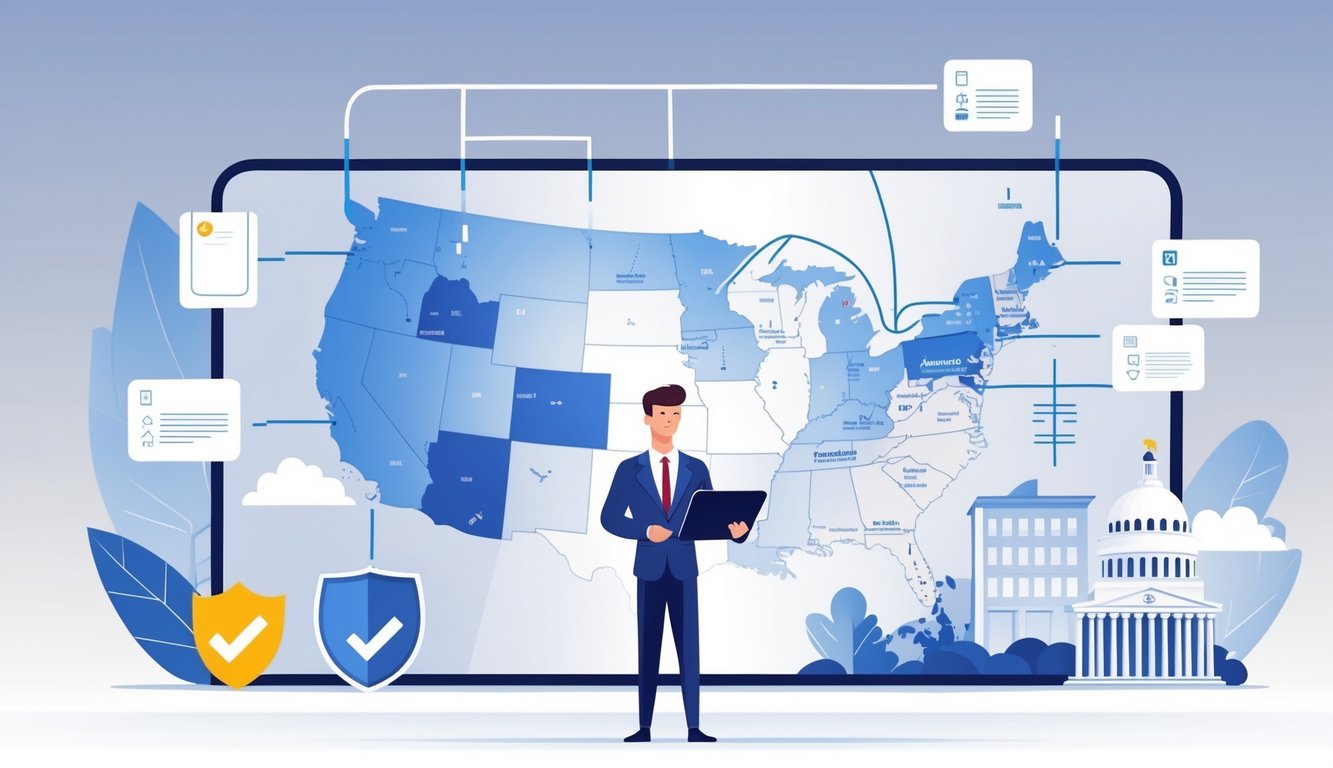Getting licensed to sell insurance in more than one state used to be a hassle.
You had to file separate applications and then wait, sometimes for months, for each state to approve you. Cross-state insurance licensing requirements really depend on the state and the kind of insurance, but recent compact agreements and some federal laws are making things easier for qualified folks who want to work across state lines. Pennsylvania’s recent participation in health care licensure compacts is a good example, showing how states are trying to speed up these processes and deal with workforce shortages.

The old licensing system puts up a lot of roadblocks for insurance pros who want to expand or help clients in other states.
Every state has its own set of rules, fees, and waiting times, which can drag out the process for months.
This setup also limits your choices as a consumer, especially when you’re hunting for specialized insurance services.
Lately, changes in federal law and new state agreements are shaking up cross-state licensing.
Compact systems now let qualified professionals get licensed in multiple states in just days, not months.
These updates touch everything from health insurance to property coverage.
It’s getting easier for you to find the right pros, and for agents to serve clients beyond their own state.
Key Takeaways
- Cross-state insurance licensing requirements aren’t the same everywhere, but new compact agreements are making things smoother for qualified professionals.
- Federal legislation and state partnerships are cutting down licensing barriers that used to take forever.
- These changes help both insurance professionals looking to grow and consumers who want specialized services from out-of-state.
Understanding Cross-State Insurance Licensing Requirements

Insurance licensing rules can vary a lot from state to state.
Each state sets its own requirements for agents and brokers.
Most states make you get a separate license, but some have reciprocity agreements to help qualified professionals move things along faster.
Fundamental Licensing Principles for Insurance Providers
You need to get a license in every state where you plan to sell insurance.
Each state acts as its own regulator and has its own rules.
Basic Requirements Include:
- Pre-licensing education hours
- Passing a state exam
- Background checks and fingerprinting
- Continuing education credits
- License renewal fees
Most states want you to complete 20-40 hours of pre-licensing education.
You’ll have to use coursework approved by the insurance department in the state you’re targeting.
The licensing exam usually covers state insurance laws, ethics, and product knowledge.
You’ll need a score between 70-75% to pass.
License Types:
- Life and Health: Covers both individual and group policies
- Property and Casualty: Includes auto, home, and commercial insurance
- Personal Lines: Only for individual consumer products
- Surplus Lines: For high-risk, specialized coverage
You can hold more than one license type at a time.
Some states even offer combined licenses that cover several product categories.
State-Specific Regulatory Agencies and Oversight
Each state’s insurance department sets and enforces licensing requirements.
These agencies decide on education standards, exam topics, and how you renew your license.
Key Regulatory Functions:
- Processing license applications
- Approving continuing education
- Investigating complaints
- Running market conduct exams
- Disciplining agents
California makes you take 52 hours of pre-licensing education for life insurance.
In Texas, it’s just 20 hours for the same license.
New York asks for extra training if you want to sell annuities.
Florida requires property agents to complete hurricane-focused continuing education.
Common Regulatory Areas:
- Consumer protection standards
- Marketing and advertising rules
- Commission disclosure
- Client data protection
You really need to keep up with each state’s rule changes.
Insurance departments send out updates all the time through bulletins and notices.
Reciprocity and Recognition of Out-of-State Licenses
A lot of states have reciprocity agreements to make it easier for you to get licensed elsewhere.
Usually, these deals let you skip pre-licensing education and exams.
Reciprocity Requirements:
- Valid home state license
- No disciplinary actions on your record
- Complete application with fees
- Pass a background check
Non-resident licenses cost anywhere from $50 to $200 per state.
Processing times can be as quick as 2 weeks or stretch to 6, depending on the state.
States with Broad Reciprocity:
- Texas accepts most out-of-state licenses
- Florida offers reciprocity with over 30 states
- Georgia has a streamlined application process
- Arizona skips exams for qualified agents
Even with reciprocity, some states add extra steps.
For example, New York always makes you pass a state-specific exam section.
Limited Reciprocity Situations:
- Recent disciplinary actions
- Expired home state licenses
- Missing continuing education
- Criminal background problems
You have to keep your home state license active to keep your reciprocal licenses valid.
If your resident license lapses, your non-resident ones usually expire too.
Recent Developments and Federal Legislation Impacting Cross-State Licensing

Federal laws and interstate agreements are changing how insurance professionals get licensed across state lines.
The National Association of Insurance Commissioners keeps working on uniform licensing standards, and new laws target specific coverage areas.
Multi-State Licensure Compacts and Interstate Cooperation
The National Insurance Producer Registry (NIPR) now makes it much easier for agents to get licensed in several states.
You can apply for non-resident licenses in different places using just one online portal.
Key NIPR Benefits:
- One application for multiple states
- Less paperwork and faster processing
- Standardized continuing education rules
- Electronic license verification
The Uniform Certificate of Authority Application (UCAA) helps insurance companies expand more easily.
You only need one application for many states, instead of repeating the process over and over.
Most states now use interstate compacts for producer licensing.
You meet continuing education requirements in your home state, and those credits count in other participating states where you’re licensed.
The Sports Medicine Licensure Clarity Act and Insurance Coverage
The Sports Medicine Licensure Clarity Act changes how insurance providers handle coverage across state lines.
This federal law lets licensed sports medicine pros provide care in other states when they travel with teams.
Insurance policies now have to cover temporary practice situations.
Coverage automatically extends when licensed professionals work out of state under this act.
Insurance Implications:
- Malpractice coverage follows the provider
- No need for extra state-specific policies
- Easier claims processing across states
- Less admin work for providers
This law might set a pattern for other medical specialties.
We could see similar rules pop up in other healthcare areas that affect insurance coverage.
Challenges and Opportunities for Insurance Providers Expanding Across States
Even with better interstate cooperation, you’ll still run into different rules in each state.
Every state keeps its own insurance code and coverage mandates that you have to follow.
Common Expansion Challenges:
- Different capital requirements
- Unique policy form approval processes
- State-specific market conduct rules
- Varied tax and fee structures
Technology can really help with multi-state compliance.
Electronic filing and automated regulatory reporting make things less of a headache when you’re working in more than one state.
As states adopt more uniform standards, you get more chances to expand.
NAIC model laws make licensing and regulatory processes more consistent across states.
Frequently Asked Questions

Cross-state insurance licensing comes with specific reciprocity agreements, different costs, and unique requirements for non-resident licenses.
Insurance agents have to deal with a mix of state rules, company standards, and policy coverage limits.
How does reciprocity affect insurance licensing requirements between states?
Reciprocity agreements let licensed insurance agents in one state get licensed in other states with fewer hoops to jump through.
You don’t have to redo pre-licensing education or take another exam in the new state.
You need an active license in your home state to get reciprocity benefits.
The state you’re applying to will usually ask for an application and some fees, but they’ll skip the testing.
Not every state has reciprocity agreements with every other state.
You’ll need to check the details for each state since reciprocity terms don’t always match up.
Some states only offer reciprocity for certain license types.
Property and casualty licenses might have different reciprocity rules than life and health insurance.
What are the costs associated with obtaining insurance licenses across multiple states?
Initial licensing fees usually run from $50 to $200 per state, depending on the license type and state rules.
These fees cover the application and your first license.
Continuing education costs add up, too—expect $100 to $500 each year per state.
You have to finish state-specific education hours to keep your licenses active.
Renewal fees are typically $25 to $100 per license every one or two years.
Some states want you to renew every year, others every two.
Some states charge background check fees, which range from $25 to $75.
Fingerprinting can cost another $50 to $100, depending on where you’re applying.
What are the steps to secure a non-resident insurance license for an out-of-state agent?
First, you need an active insurance license in your home state.
That’s the base for all your non-resident applications.
Send a non-resident license application to the insurance department in the state you want to work in.
You’ll have to include proof of your home license and fill out their forms.
Pay the application fees, which change depending on the state and license type.
Most states process applications in 10 to 30 business days once they have everything.
Complete any extra requirements that state might have, like extra courses or an exam.
Some states skip these steps if you already have an equivalent license in a state they recognize.
What are the general requirements for becoming an insurance producer in the United States?
You need to be at least 18 years old in most states to apply for an insurance producer license.
A few states ask you to be 21 for certain license types.
Take pre-licensing education courses, usually between 20 and 40 hours, depending on your state and license.
These courses cover the basics, state rules, and ethics.
Pass the state licensing exam, usually with a score of 70% or higher.
The test checks your understanding of insurance and state-specific rules.
Most states want a background check and fingerprints.
Criminal convictions might stop you from getting some types of insurance licenses.
Is it possible to hold an insurance policy in one state while being licensed as an agent in another?
You can buy insurance in any state where you live or have something to insure.
Where you’re licensed as an agent doesn’t limit where you can get personal insurance.
Insurance companies usually sell you policies based on where you live or where your property is.
The state that licensed you as an agent doesn’t affect your eligibility as a buyer.
Some insurers might give their agents benefits or discounts, no matter which state issued their license.
You can’t sell insurance to yourself in most states because of conflict of interest rules.
You’ll need another licensed agent to handle your own coverage.
What specific licenses are needed to operate as an insurance agent at a national insurance company?
You’ll need property and casualty licenses if you want to sell homeowners, auto, or commercial insurance.
Most big insurance companies expect their agents to have these licenses when handling personal or business coverage.
Life and health licenses let you sell life insurance, disability, and health insurance products.
A lot of national companies want agents to have both property/casualty and life/health licenses, so you might end up juggling a few.
If you want to sell insurance in different states, you’ll need a separate license in each one. National insurance companies usually help agents figure out which licenses they need for each state.
Some products, like variable annuities or long-term care insurance, need special licenses.
These often come with their own exams and extra education requirements, which can be a bit of a hassle.
A few national insurers actually help their agents with the licensing process and might even cover the fees.
It’s worth asking your employer if they offer sponsorship or reimbursement for licenses.






